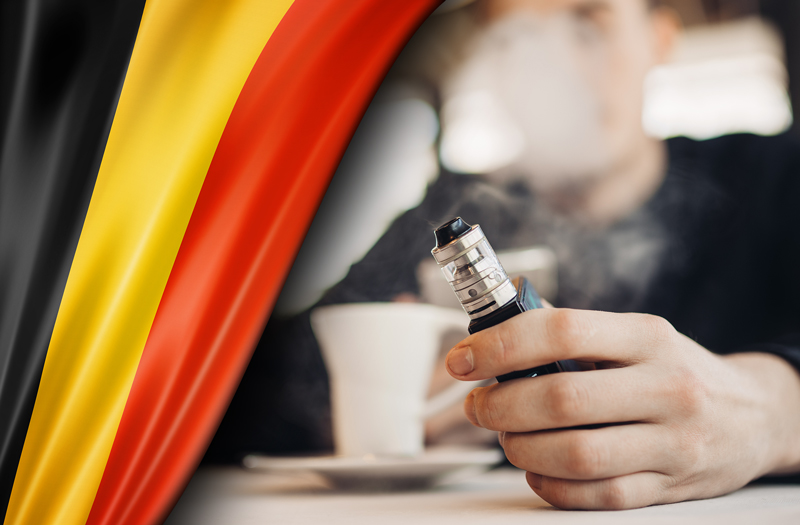Belgium: The Kingdom of Threatened Freedoms?
For the French, the Belgian border has always held a real fascination. Endless tobacco shops, supermarkets selling cheap alcohol and cigarettes, affordable fuel, lively and generous restaurants, 24/7 open night shops... that was the image Belgium portrayed, attracting a large number of cross-border visitors and curious onlookers to the Parisian region.
For a long time, Belgium was seen as a space of joyful freedom, abundance, in stark contrast to the dreary and gloomy France just across the border.
However, in recent years, a new wind has been blowing over the Kingdom of Belgium to the point where one might wonder if Belgium has not become France... but worse!
It must seem sweet to Belgians to remember those months when they had no government, and no one was telling them how to live, what to drink, what to eat, what to think, or what to smoke... The real signal of change in Belgium was when the authorities decided to mimic the French decree banning smoking in public places. While France banned smoking in cafes and restaurants in 2006, Belgium remained a haven of freedom. But in 2011, our Belgian neighbors decided to follow in France's footsteps, the first step in a long series of restrictions that now seem to have no limits.
This Friday, November 17, the Belgian government announced the adoption of a series of measures that will significantly restrict smoking, trading, and vaping freedoms. Here is a selection of the proposed actions:
1. Ban on displaying tobacco products
A display ban will be in effect from January 1, 2025. Starting from that date, it will be illegal for anyone to visibly display cigarettes, vapes, etc., in stores. The products must be placed in a separate room or stored in a drawer or cabinet to avoid being displayed.
2. Ban on selling tobacco products
Temporary points of sale, such as festivals, will no longer be allowed to sell tobacco products starting from 2025. The ban on selling tobacco products in supermarkets larger than 400 m² will be advanced. This ban will come into effect on 01/07/2025 (instead of 01/01/2028).
Horeca establishments will still be allowed to sell tobacco. Smoking areas will also remain allowed, but access will be restricted to minors. Horeca establishments will be subject to strict controls, and if violations are found, the establishment may be temporarily closed.
3. More places where smoking is prohibited, especially where children and youth go
Starting from January 1, 2025, a smoking ban will be enforced in many places across the country, especially where many children and young people go. In 2022, we decided to ban smoking in amusement parks, animal parks, children's farms (during activities), and playgrounds, among others. We continue to expand the list of public places where smoking is prohibited. Thus, it will also be prohibited to smoke on and next to sports fields, except for horeca terraces near a sports field. However, a secluded smoking area can be arranged at these locations.
Starting from January 1, 2025, it will be prohibited to smoke within a 10-meter radius of the entrance and exit of healthcare, reception, and educational facilities, as well as public libraries. The obligation to indicate this non-smoking area will also be introduced.
4. Extension of the smoking ban in means of transportation
Smoking was already banned in public transportation (trains, trams, buses, etc.), but this measure will now extend to professional passenger transport: taxis, buses, etc. This ban will come into effect immediately upon the publication of the law (spring 2024).
5. Increase in tobacco taxes
The prices of cigarettes, rolling tobacco, and electronic cigarettes will increase significantly on January 1. The impact of a series of decisions made during government formation and budgeting for 2024 results in a nominal total excise tax increase of 52 euros per 1000 cigarettes and 42.6 euros per kilogram of rolling tobacco. So, the price of a pack of cigarettes would increase by about 2 euros (+- 25%, depending on the manufacturer's price, of course). For electronic cigarettes, an excise tax of 0.15 euros per ml is introduced.
6. Stricter controls with the possibility of closure
In 2024, the Belgian state will launch an extensive control campaign regarding the sale and advertising of tobacco. The inspection services of the DGAPF within the SPF SPSCAE, responsible for tobacco and smoking legislation control, will have additional powers from next year within the framework of public health protection. Therefore, if violations are detected, they can potentially close the controlled establishment (ranging from one hour to 30 days). The same expansion of action possibilities is also being considered for customs and excise administration.
In the near future, the administration also intends to increase the use of "mystery shopping" as a control mechanism by hiring students to check if stores comply with the rules. Here too, closures may be imposed. Possibilities for this purpose are currently being prepared.
Finally, starting from January 1, 2025, the law will require age verification of the buyer if they appear to be under 25 years old. The age limit for tobacco sales will remain at 18 years old.
7. Stricter policy on electronic cigarettes
The Royal Decree on electronic cigarettes already bans attractive features of the product, such as lights. Similarly, the flavor of electronic cigarettes can only be displayed on the packaging in a neutral manner. This RD has been in effect since July 2023, but a transitional phase remains in place for retailers until January 11, 2024.
The government also intends to ban disposable electronic cigarettes starting from 2025. In 2021, it submitted a regulation to the European Commission prohibiting disposable electronic cigarettes. The dossier has recently been supplemented with additional arguments.
8. Ban on nicotine pouches
The Belgian government believes that nicotine pouches, like electronic cigarettes/vapes, can serve as a gateway to tobacco use at an early age. Since October 1, 2023, the sale of nicotine pouches is prohibited in our country. We are taking this action because the protection of the health of children and young people is an absolute priority.
9. Nicotine replacement therapy...
The Belgian government is considering the reimbursement of nicotine replacement therapies. A dossier on nicotine substitutes is currently under review by the Medicines Reimbursement Commission. A decision will be made in spring 2024.
10. Extension of regulations to all tobacco products and similar products
Some rules already imposed on traditional cigarettes do not yet apply to other tobacco products. In 2024, we will therefore expand the existing regulations. Cigars and cigarillos, for example, will be subject to combined health warnings, and standardized packaging will be mandatory for all tobacco products and plant-based smoking products (vapes, water pipes, etc.). The online sale of tobacco was already prohibited, but we will now extend this prohibition to devices used for smoking tobacco or plant-based products (vapes, water pipes, etc.). We also plan to require a notice to be included in every unit of packaging for all tobacco products. The form this notice should take is currently being developed.
Vaping Assimilated to Tobacco: A Nonsensical Approach to Prevention
One of the most critiqued aspects of this plan for a drastic reduction in public freedoms, beyond the questions it raises about the infantilization of citizens, is the severe blow it deals to the development of vaping and nicotine substitutes that are not prescribed by doctors.
While numerous studies demonstrate the major positive impact of vaping in terms of risk reduction, the Belgian government aims to undermine the vaping industry and imposes regulatory obligations and limitations as stringent as those imposed on tobacco. At a time when the use of substances like cannabis is moving towards decriminalization, and even full legalization, the electronic cigarette is considered, without clear reason, as "a gateway to tobacco" rather than a powerful tool for risk reduction. This position cannot be understood without also considering the project to reimburse nicotine substitutes prescribed by doctors. The population of smokers in Belgium seems to be the target of an economic war in which healthcare professionals have won the first battle by claiming the exclusive right to care, to the detriment of the clear interests of patients who could find an effective and economical way to quit smoking through vaping. In the name of public health, the Belgian government is increasing its control over its citizens and striving to further shape them each year... We can only hope that this treatment of the people will not go without dire consequences for our Belgian friends...









